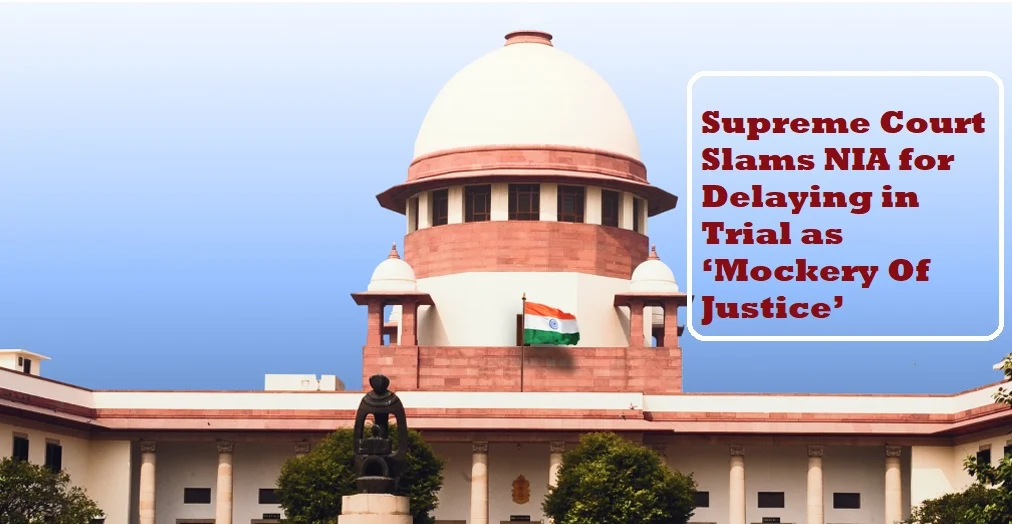New Prism, Delhi Desk
NEW DELHI: In a landmark verdict, the Supreme Court of India delivered a scathing critique of the National Investigation Agency (NIA), trial courts, and the Bombay High Court for prolonged trial delays, labeling them as undermining justice. The apex court granted bail to Javed Shaikh, who had spent four years in jail without charges being framed against him.
A Division Bench comprising Justices J.B. Pardiwala and Ujjal Bhuyan issued the ruling after hearing an appeal challenging the Bombay High Court’s earlier decision in February, which had denied bail to Shaikh.
“We are convinced that the manner in which the prosecuting agency as well as the Court have proceeded, the right of the accused to have a speedy trial could be said to have been infringed thereby violating Article 21 of the Constitution,” remarked the Supreme Court bench.
Indiatomorrow.net reports Javed Shaikh, a 36-year-old resident of Kalwa in Thane district, was arrested on February 9, 2020, by the Mumbai police upon his arrival from Dubai at Chhatrapati Shivaji Maharaj International Airport. The arrest was based on allegations of possession of high-quality fake currency notes amounting to nearly Rs 24 lakh. Mumbai’s Joint Commissioner of Police (Crime) Santosh Rastogi indicated that Shaikh was suspected of transporting similar consignments following visits to Dubai and Bangkok, prompted by intelligence inputs from central agencies including the CIA.
The National Investigation Agency (NIA) took over the case on February 14, 2020, re-registering it under charges related to Fake Indian Currency Notes (FICN) circulation. Subsequently, on August 6, 2020, the NIA filed a charge sheet against Shaikh under various sections of the Indian Penal Code (IPC) and the stringent Unlawful Activities (Prevention) Act (UAPA). The charge sheet accused Shaikh of conspiring with unnamed individuals between October 2019 and February 2020 to circulate FICN worth Rs 23,86,000, allegedly aiming to undermine India’s monetary stability.
In granting bail, the Supreme Court underscored fundamental aspects of criminal justice and the rights of the accused.
The bench reiterated that every accused person, regardless of the severity of the charges against them, is entitled to a speedy trial under Article 21 of the Indian Constitution. It highlighted the failure of the trial court to frame charges against Shaikh even after four years of detention, noting the prosecution’s plan to call eighty witnesses, which raised concerns about prolonged trial proceedings.
The court emphasized the presumption of innocence until proven guilty, asserting, “The over-arching postulate of criminal jurisprudence that an accused is presumed to be innocent until proven guilty cannot be brushed aside lightly, howsoever stringent the penal law may be.”
Furthermore, the court expressed dismay over the prolonged detention of individuals awaiting trial, cautioning that bail should not be withheld as a form of punishment. It criticized the lapse in adhering to the NIA Act of 2008, which mandates day-to-day trials for cases under its purview, emphasizing the need for expedited judicial proceedings in such matters.
The Supreme Court’s decision has sparked reactions from various quarters, reflecting on broader implications for India’s criminal justice system.
Manu Sebastian, Managing Editor of Live Law, drew parallels with other cases involving prolonged detentions awaiting trial, such as the Bhima Koregaon case.
Social media reactions highlighted concerns over perceived biases in the judicial system. Writer Sangita criticized what she viewed as the politicization of legal processes, citing instances like Umar Khalid and Bhima Koregaon cases that have seen prolonged trials without resolution.
Journalist and author Debasish Roy Chowdhury directed criticism towards the judiciary, asserting, “Holding a person in jail for four years without charges or trial is the real mockery of justice.”
Journalist Utkarsh Anand noted, “Article 21 of the Constitution guarantees the right to life and personal liberty, including the right to a speedy trial as established through various Supreme Court rulings.”
The case of Javed Shaikh, prosecuted under the stringent UAPA, highlights systemic flaws in India’s legal framework, particularly concerning the prolonged detention of undertrials. The Supreme Court’s verdict not only offers relief to an individual but also sets a precedent that could influence future judicial proceedings. There are growing calls for reforms aimed at expediting trials and ensuring transparency and accountability in cases involving national security concerns.

